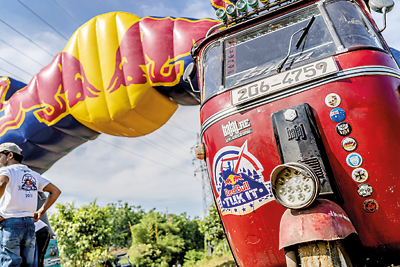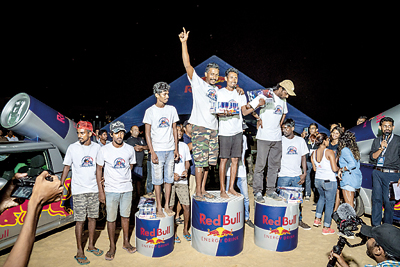‘Weliweriya Boom 6′ took it first time out
 A total of 155 teams comprising 465 participants gathered at Moonemale Estate at Kaluaggala on a bright and sunny April 7 for the 2nd edition of ‘Red Bull Tuk It’.
A total of 155 teams comprising 465 participants gathered at Moonemale Estate at Kaluaggala on a bright and sunny April 7 for the 2nd edition of ‘Red Bull Tuk It’.
Stage 1 of this year’s ‘Red Bull Tuk It’ put the participants through an initial obstacle course designed to duplicate the conditions of the terrain in Stage 2. Lasting for more than 36 hours and crossing more than 15 cities, over a distance of 200 km, from Kaluaggala to Negombo, through a challenging route that involved hill-climbs, river-crossings, mud pits and extreme weather.
Many of the returning teams from 2017 knew what to expect from ‘Red Bull Tuk It’, and hence, were well prepared for more than 35 hours of Sri Lanka’s most extreme tuk-tuk challenge. Even though being a new team, ‘Weliweriya Boom 6′ got a hold of survival tips quickly, by conversing with the returning teams, coupled with great Round 1 points lead and patient navigational instruction through Round 2, led them to claim top spot on the podium.
 Team ‘Nipun Baja’ from Negombo and ‘Weliweriya Boom 3′ finished 2nd and 3rd respectively, after careful tracking of the unforgiving terrain through sheer patience and efficient teamwork. It is a noteworthy fact that all 3 podium finishers this year were new teams.
Team ‘Nipun Baja’ from Negombo and ‘Weliweriya Boom 3′ finished 2nd and 3rd respectively, after careful tracking of the unforgiving terrain through sheer patience and efficient teamwork. It is a noteworthy fact that all 3 podium finishers this year were new teams.
The ‘Most Creative tuk-tuk’ award was won by Team No.067 from Nuwara Eliya, for the most original design using the Red Bull can.
“We were really excited to be a part of such a great event like ‘Red Bull Tuk It’. We had some idea of what it would be like, from talking to last year’s teams. But, in reality, the route was tougher than we expected. But, at the same time, it also showed us how beautiful our country really is, with all the views we got from the mountaintops, until we hit the beach park in Negombo. We are definitely looking forward for next year’s ‘Red Bull Tuk It’, to defend our title,” said Weliweriya Boom 6, the winning team of ‘Red Bull Tuk It’ 2018.
‘Red Bull Tuk It’ is a rally style challenge that utilizes Sri Lanka’s most used form of transportation – the tuk-tuk, while allowing teams to take in the iconic beauty of Sri Lanka. The course is not necessarily physical, but by accomplishing tasks, which are a combination of active adventure, getting to grips with tasks of local traditions and then, the ultimate satisfaction of reaching the end, brings the essence of what the project is all about.


